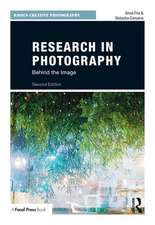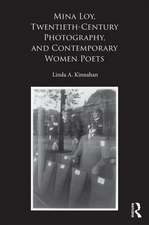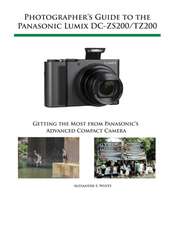Science for the Curious Photographer: An Introduction to the Science of Photography
Autor Jr. Charles Johnsonen Limba Engleză Hardback – sep 2017
Addressing the complex aspects of digital photography, the book discusses color management, resolution, "noise" in images, and the limits of human perception. The creation and appreciation of art in photography is discussed from the standpoint of modern cognitive science.
A crucial read for those seeking the scientific context to photographic practice, this second edition has been comprehensively updated, including discussion of DSLRs, mirror-less cameras, and a new chapter on the limits of human vision and perception.
| Toate formatele și edițiile | Preț | Express |
|---|---|---|
| Paperback (1) | 358.83 lei 6-8 săpt. | |
| Taylor & Francis – 28 aug 2017 | 358.83 lei 6-8 săpt. | |
| Hardback (1) | 828.07 lei 6-8 săpt. | |
| Taylor & Francis – sep 2017 | 828.07 lei 6-8 săpt. |
Preț: 828.07 lei
Preț vechi: 1107.58 lei
-25% Nou
Puncte Express: 1242
Preț estimativ în valută:
158.50€ • 172.23$ • 133.23£
158.50€ • 172.23$ • 133.23£
Carte tipărită la comandă
Livrare economică 21 aprilie-05 mai
Preluare comenzi: 021 569.72.76
Specificații
ISBN-13: 9780415793223
ISBN-10: 041579322X
Pagini: 304
Ilustrații: 170
Dimensiuni: 178 x 254 mm
Greutate: 0.91 kg
Ediția:2
Editura: Taylor & Francis
Colecția Routledge
Locul publicării:Oxford, United Kingdom
ISBN-10: 041579322X
Pagini: 304
Ilustrații: 170
Dimensiuni: 178 x 254 mm
Greutate: 0.91 kg
Ediția:2
Editura: Taylor & Francis
Colecția Routledge
Locul publicării:Oxford, United Kingdom
Public țintă
Postgraduate and UndergraduateCuprins
1. What is photography?
2. What is light?
3. The camera: An introduction
4: Images: What is perspective?
5. Why does a camera need a lens?
6. Elementary optics: How do lenses work?
7. The simple thin lens and what it does
8. How to make lenses that are good enough for photography
9. Coming to terms with real camera lenses
10. Fisheye lenses and how they capture the whole sky
11. What is an equivalent image?
12. How to get really high magnification
13. Do we need filters anymore?
14. The limits of human vision
15. How can color be managed?
16. Image capture and processing
17. What is perceived image quality?
18. The creation and appreciation of art in photography
19. What we see and how we photograph it
20. Appendices
2. What is light?
3. The camera: An introduction
4: Images: What is perspective?
5. Why does a camera need a lens?
6. Elementary optics: How do lenses work?
7. The simple thin lens and what it does
8. How to make lenses that are good enough for photography
9. Coming to terms with real camera lenses
10. Fisheye lenses and how they capture the whole sky
11. What is an equivalent image?
12. How to get really high magnification
13. Do we need filters anymore?
14. The limits of human vision
15. How can color be managed?
16. Image capture and processing
17. What is perceived image quality?
18. The creation and appreciation of art in photography
19. What we see and how we photograph it
20. Appendices
Notă biografică
Charles S. Johnson, Jr. taught chemistry at Yale University and the University of North Carolina at Chapel Hill. He now uses his scientific background to research and write about the science behind photography. In 2010 he published Science for the Curious Photographer.
Descriere
While there are many books that teach the "how-to" of photography, Science for the Curious Photographer is a book for those who also want to understand how photography works.


















